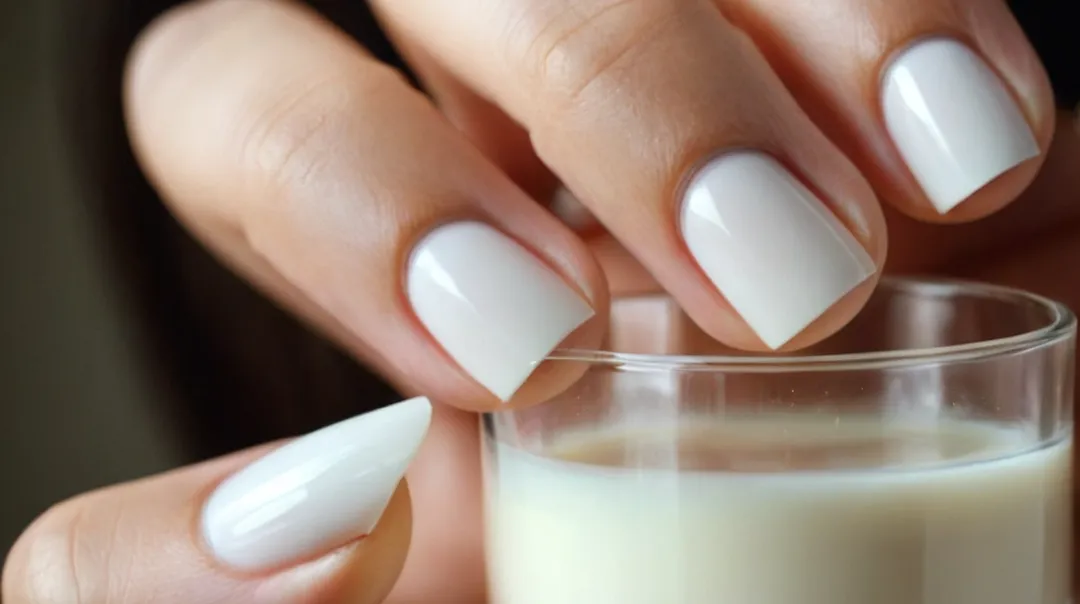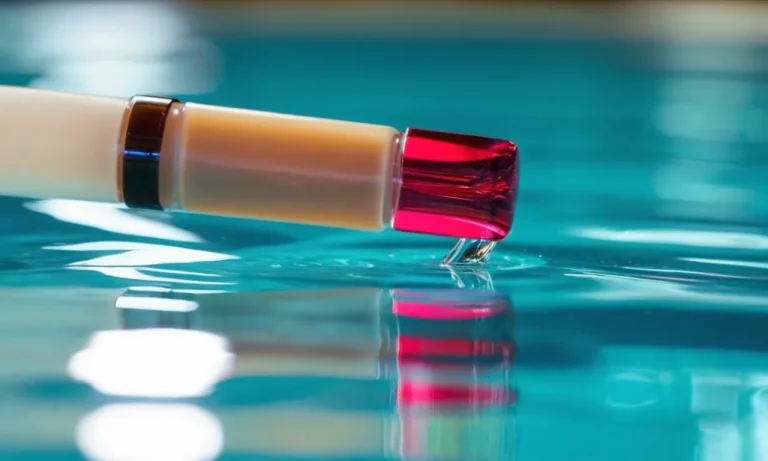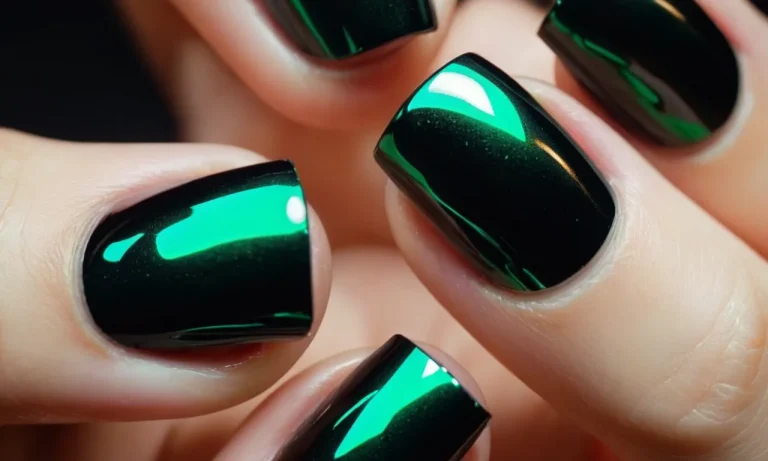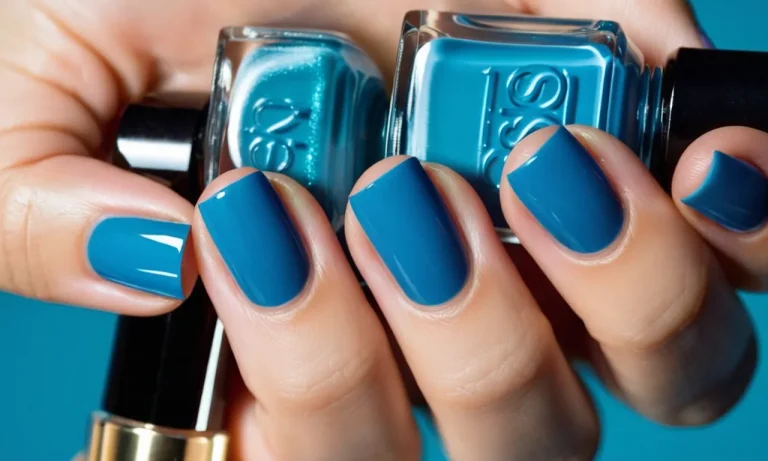Does Milk Make Your Nails Grow? A Comprehensive Look
If you’ve ever broken a nail and wanted it to grow back faster, you may have wondered if drinking milk can help speed up nail growth. Milk is often touted for its many health benefits, from strong bones to glowing skin, but what about stronger nails?
In this comprehensive guide, we’ll take an in-depth look at the science behind milk and nail growth to help you understand if gulping down glasses of the white stuff can truly lead to longer, healthier nails.
There are several key nutrients found in milk that play important roles in the formation of keratin, the protein that makes up your nails.
The Connection Between Biotin and Nails
What is biotin?
Biotin, also known as vitamin B7 or vitamin H, is a water-soluble B vitamin that plays an important role in nail health and growth. It helps the body metabolize fats, carbohydrates, and amino acids which are essential for strong and healthy nails.
Biotin also increases keratin production which makes up your hair and nails. Without adequate biotin intake, you may experience brittle nails that break easily.
How biotin contributes to nail growth
Biotin contributes to nail growth in a few key ways:
- It promotes the production of keratin – the main protein that makes up your nails. Keratin gives strength and rigidity to nails.
- It increases the rate of nail cell multiplication. Faster cell production equals faster nail growth.
- It acts as a coenzyme in cell growth and fatty acid synthesis needed for nail plate development.
- It may help increase blood circulation which provides nutrients to nail beds for growth.
Essentially, getting enough biotin in your diet supports rapid and healthy nail growth by providing the compounds and building blocks your nails need to thrive. Pretty amazing!
How much biotin do you need for nail growth?
The recommended daily intake of biotin is 30 micrograms for adults over 19 years old. This is generally enough biotin to maintain strong, healthy nails in most people. However, some experts believe you may need higher amounts – from 2,500mcg to 10,000mcg per day – to notice significant nail growth effects.
According to a 2017 study, taking 2,500mcg of biotin daily led to a 25% increase in nail plate thickness after 6 months. Another study in 2004 found similar results with 2,500mcg over 1 year. While promising, more research is still needed to confirm optimal biotin dosages for nail growth.
The bottom line is that getting adequate amounts of biotin can make a big difference for your nails. Aim for at least 30mcg daily from your diet or supplements. Some foods rich in biotin include eggs, salmon, avocados, nuts and seeds.
If your nails are weak or brittle, try a biotin supplement with 2,500-5,000mcg for fuller, stronger nails over time. But be patient – it can take months to see transformative results!
Other Nutrients in Milk That Promote Nail Health
Protein
Protein is an essential nutrient for strong, healthy nails. Nails are made of keratin, which is a protein. Getting adequate protein in your diet provides the amino acids needed to build keratin and promote nail growth. Cow’s milk is a great source of high-quality protein, with about 8 grams per cup.
The protein in milk contains all 9 essential amino acids required for keratin synthesis. Consuming enough protein from foods like milk, yogurt, cheese, eggs, meat and fish can help build strong nails that resist peeling, cracking and breakage.
Calcium
Calcium is the most abundant mineral in nails. It accounts for about 30% of nail composition by weight. This important mineral plays a key role in nail plate growth and structure. Low calcium intake is linked to development of brittle nails that split and break easily.
Cow’s milk is an excellent dietary source of calcium, providing around 300 mg per cup. Getting enough calcium from your diet or supplements ensures your body has enough to properly mineralize the nail plate, leading to hard, rigid nails.
Vitamin D
Vitamin D is crucial for absorbing the calcium in milk and transporting it to nails. This fat-soluble vitamin promotes calcium deposition during nail plate formation. A deficiency in vitamin D leads to reduced calcium absorption, resulting in nails that are soft and peel easily.
Cow’s milk is fortified with vitamin D, providing about 120 IU per cup. Consuming dairy and getting adequate sun exposure ensures sufficient vitamin D levels for optimal utilization of calcium and nail health.
Vitamin A
Vitamin A is important for nail growth and strength. It stimulates production of keratin by nail bed cells. Cow’s milk provides vitamin A in the form of retinol. One cup contains 227 IU of vitamin A, which is 10% of the RDI. Low intakes of vitamin A are linked to increased risk of brittle nails.
Consuming milk, cheese, yogurt and other vitamin A-rich foods helps maintains adequate levels for healthy nail production.
What The Research Says About Milk and Nails
Observational Studies on Dairy and Nails
Several observational studies have analyzed the association between dairy consumption and nail health. A 2020 cross-sectional study published in the Journal of Cosmetic Dermatology found that women who consumed more low-fat dairy products tended to have stronger nails that were less likely to split or break (source).
This study analyzed data from over 2,500 women aged 18-74 years. An earlier study from 2016 also noted that higher intake of dairy calcium was correlated with reduced nail plate abnormalities (source).
While these studies show an association, they do not prove cause and effect. More clinical research is needed to determine if dairy consumption directly impacts nail growth and quality.
Clinical Studies on Biotin Supplements and Nails
Several clinical studies have analyzed the effects of biotin supplements on nails. Biotin, one of the B complex vitamins, plays an important role in the formation of keratin, a fibrous structural protein abundant in hair and nails.
A 2007 double-blind placebo controlled trial published in the journal Cutis tested the impact of 2.5 mg/day of biotin supplementation in women complaining of brittle nails (source). After an average of nearly 7 months, 63% of the women taking biotin supplements reported improved nail firmness and thickness compared to only 11% in the placebo group.
Since dairy products like milk and cheese contain biotin, adequate consumption may support nail health.
However, high dose biotin supplements can interfere with certain lab tests, producing falsely high or low results (FDA warning). Individuals undergoing thyroid lab testing should consult their doctor before taking biotin supplements.
Tips For Growing Strong, Healthy Nails
Consume biotin-rich foods
Biotin, also known as vitamin B7, is an essential nutrient that aids in keratin production – the protein that makes up your hair and nails. Consuming biotin-rich foods can help strengthen brittle nails from the inside out. Great options include:
- Eggs
- Salmon
- Avocados
- Almonds
- Sweet potatoes
You can also take a daily biotin supplement, but be sure to check with your doctor first regarding dosage. The recommended daily intake is 30 micrograms.
Eat a balanced diet
Your nails require various vitamins and minerals to grow healthily. Be sure your diet includes:
- Protein – found in eggs, poultry, fish, and beans
- Zinc – found in seafood, red meat, legumes, and nuts
- Iron – found in red meat, eggs, spinach and lentils
- Calcium – found in dairy products, leafy greens, and tofu
If your nails are soft or brittle, you may have nutritional deficiencies. Visit your doctor to get tested and find out exactly what you need to supplement.
Stay hydrated
Drinking adequate water is crucial for nail growth and strength. According to the U.S. National Academies of Sciences, Engineering, and Medicine, women should consume at least 11.5 cups (2.7 liters) of fluids daily and men should consume 15.5 cups (3.7 liters).
Symptoms of dehydration include:
- Fatigue
- Dizziness
- Dry nails and skin
Carry a water bottle and set reminders to drink throughout the day. Infusing your water with fruits and vegetables can also help you take in more fluids.
Use nail strengtheners and moisturizers
Using targeted products can give your nail care routine an extra boost. Look for nail strengtheners containing ingredients like calcium, essential oils, and hydrolyzed wheat protein. These can help reinforce nails and stop them from chipping or splitting.
For severely damaged nails, get a prescription treatment from your dermatologist.
It’s also crucial to keep nails moisturized to avoid brittleness. Apply a daily cuticle oil containing jojoba, vitamin E or olive oil. You can also massage in a thick hand cream whenever your hands feel dry.
The Takeaway: Can Milk Make Your Nails Grow?
The answer is maybe. There is some evidence that suggests drinking milk and getting enough calcium in your diet can contribute to healthy nail growth. However, the impact is likely small and there are many other factors that affect nail growth as well.
The Potential Benefits of Milk for Nails
Milk is rich in nutrients like calcium, protein, vitamin D and biotin which help support keratin infrastructure. Keratin is a key structural protein that makes up your hair, skin and nails. Getting enough of these nutrients may contribute to stronger, healthier nails that resist breaks and grow faster.
For example, one study found that increasing dietary calcium intake increased nail thickness and reduced breaks in women. Another study showed biotin supplements improved nail thickness and hardness. So getting these nutrients from milk may provide some nail benefits.
Other Important Factors for Healthy Nails
However, there are many other crucial things that impact nail growth and health as well. Some other key factors include:
- Genetics – Some people are just prone to faster/slower nail growth
- Age – Nails tend to grow slower as we get older
- Health conditions – Issues like malnutrition or thyroid disorders can affect nails
- Medications – Certain drugs are linked to nail brittleness or other issues
- Injuries – Physical trauma can temporarily halt growth
- Lifestyle habits – Things like smoking, nail treatments, hand washing frequency also play a role
So while milk and its nutrients may provide some benefit, many factors outside of diet impact nail health. Someone who drinks milk regularly can still have nail issues if other causes like medications or aging are responsible.
The Takeaway
Can drinking milk help your nails grow? Possibly. Milk provides key nutrients like calcium, protein and biotin that help support keratin infrastructure. This may in turn contribute to slight improvements in nail strength, thickness and growth rate.
However, many other factors also significantly influence nail health. So milk is just one small piece of the puzzle. Getting enough key nutrients is important, but genetics, age, health conditions and lifestyle play a big role as well.
Conclusion
While the vitamins and minerals in milk, especially biotin, certainly contribute to overall nail health, science doesn’t definitively prove that milk itself makes nails grow faster or longer. However, incorporating milk and other biotin-rich foods as part of a balanced diet full of proteins, vitamins, and minerals can certainly support strong, healthy nails alongside proper nail care practices.







